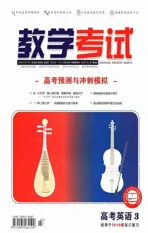对比辨析 突破动词时态
2019-01-10河南
河南
动词时态是中学英语基础语法知识中的一个重点内容,也是历年高考的考查热点。考生由于在知识上存在误区,因此在考试时常会在动词时态上失分。本文将以高考真题为例,探讨如何突破动词时态的难点。
一、一般过去时与现在完成时的区别
1.一般过去时表示在过去某个时间发生的动作或存在的状态,通常句中有一个表示过去的时间状语。有时,即使句中没有明确的时间状语,但通过上下文暗示可知某个动作在过去发生时,也应用一般过去时。例如:
(1) The Chinese Ministry of Agriculture finds that between 2005 — when the government ________ (start) a soil-testing program which gives specific fertilizer recommendations to farmers —and 2011,fertilizer use dropped by 7.7 million tons.(2018 年全国卷Ⅱ,语法填空68)
【解析】句意为“中国农业部发现,在2005年与2011年之间,政府启动了一项土壤测试项目……”。破折号之后为when引导的定语从句,先行词是“2005”,关系词在从句中作时间状语。由于本句含有时间状语“between 2005...and 2011”,可知此处陈述的是过去发生的事,谓语动词应用一般过去时。故填started。
(2) When the gorillas and I frightened each other,I was just glad to find them alive.True to a gorilla's unaggressive nature,the huge animal_________ (mean) me no real harm.(2018 年全国卷Ⅲ,语法填空69)
【解析】句意为“……由于天性,大猩猩没有攻击性。这只高大的黑猩猩对我并没有恶意”。分析句子成分可知,本句缺少谓语动词,因前句为一般过去时,所以本句也用一般过去时。故填meant。
(3) It was raining lightly when I ________ (arrive) in Yangshuo just before dawn.(2015年全国卷Ⅰ,语法填空61)
【解析】句意为“当我在黎明前到达阳朔时,天正下着小雨”。本句为when引导的时间状语从句,主句为过去时,从句也应用一般过去时。故填arrived。
(4) When I was a child,I hoped to live in the city.I think I would be happy there.(2015年全国卷Ⅰ,短文改错)
【解析】句意为“在我小时候,我希望住在城里。我想,住在那儿我会很快乐”。本句叙述的是少年时代的事情,因此谓语动词应用一般过去时。故把think改为thought。
(5) Tony was scared and begun to cry.(2015年全国卷Ⅱ,短文改错)
【解析】句意为“托尼很害怕,开始哭了起来”。并列连词and前面用了一般过去时,后面也应用一般过去时。故把begun改为began。
【注意】常用一般过去时的几种情况:
①用when询问过去发生的动作或存在的状态。例如:
I hear you have studied abroad.When did you come back?
②在“It is/has been + 时间段 + since从句”中。例如:
It has been forty years since China adopted the opening policy.
③在“It is (high) time+that从句”中。例如:
The college entrance examination is approaching.It is high time that we put our heart into our lessons.
④在“as if,I wish,if only + 从句”中,表示陈述的某种情况与现在的事实相反。例如:
Peter talks as if he knew everything.
I wish I didn't have to hand in my homework today.
If only I were not too careless.
⑤表示与现在事实相反的虚拟语气。例如:
If I were not busy today,I would go hiking with you.
⑥在“would prefer,I would rather”后的从句中,表示说话人的愿望与现在的事实相反。例如:
I'd prefer you came tomorrow.
I would rather you didn't go out alone.
2.现在完成时表示过去发生或已经完成的动作对现在造成的影响或结果,或从过去已经开始,持续到现在的动作或状态。通常与现在完成时连用的副词和短语有already,yet,just,ever,recently,lately,today,this week,these days,so far,during/in/over the past/last few days/weeks/months/years/decades/centuries,for + 时间段,since + 过去的某一时刻等。例如:
(1) Since 2011,the country _________ (grow) more corn than rice.(2018年全国卷Ⅱ,语法填空61)
【解析】句意为“自2011年以来,中国种植的玉米比水稻多”。根据时间状语“Since 2011”可知,谓语动词要用现在完成时。故填has grown。
(2) I had grown not only physically,but also mentally in the past few years.(2017年全国卷Ⅲ,短文改错)
【解析】句意为“在过去的五年里,我的身心都得到了成长”。根据时间状语“in the past few years”可知,谓语动词应用现在完成时态。故把had改为have。
(3) The number of firms selling computers in this region_______ (drop) since January 2012.(2017年3月天津卷,单项填空1,改编)
【解析】句意为“自2012年1月以来,该地区销售电脑的公司数量减少了”。根据题干中的时间状语“since January 2012”可知,谓语动词应用现在完成时,主语“The number of”意为“……的数量”是单数含义。故填has dropped。
(4) Despite the previous rounds of talks,no agreement______ (reach) so far by the two sides.(2015年天津卷,单项填空9,改编)
【解析】句意为“尽管先前进行过几轮谈判,但是双方至今尚未达成任何协议”。本句中含现在完成时的标志短语“so far”,应用现在完成时。故填has been reached。
(5) We won't start the work until all the preparations______ (make).(2014年天津卷,单项填空11,改编)
【解析】句意为“直到做好所有的准备工作,我们才会开始工作”。强调从句的动作完成后,主句的动作才发生,从句应用现在完成时,根据句意可知,此处应用被动语态。故填have been made。
【注意】常用现在完成时的几种情况:
①在“It is the first/second...time + that从句”中。例如:
It is the first time that I have spoken in front of a group of people.
②在“It has been + 时间段 + since从句”中。例如:
It has been ten years since they last met in Beijing.
③在“not...until...结构”中,主句谓语动词用将来时,从句的谓语动词用现在完成时。强调在从句的动作完成后,主句的动作才发生。例如:
I will not go out to play until I have finished my homework.
④在“This is the + 形容词最高级 + 定语从句”中。例如:
This is the most exciting story I have ever read this year.
二、现在完成时与现在完成进行时的区别
现在完成时表示某个动作已经完成,并且对现在造成了一定影响。而现在完成进行时则表示一个动作从过去开始,持续了一段时间,尚未完成,且有可能继续持续下去。例如:
(1) Since then—for all these years—we had been allow ing tomatoes to self-seed where they please.(2014年全国卷Ⅰ,短文改错)
【解析】根据时间状语“Since then”可知,本句应用现在完成进行时。故将had改为have。
(2) I ________ (read) half of the English novel,and I'll try to finish it at the weekend.(2016年北京卷,单项填空25,改编)
【解析】句意为“我已经读了这本英语小说的一半,我打算周末把剩下的读完”。逗号之前表示说话时已经完成的动作,应用现在完成时。故填have read。
(3) Dashan,who _________ (learn) crosstalk,the Chinese comedic tradition,for decades,wants to mix it up with the Western stand-up tradition.(2016年江苏卷,单项填空29,改编)
【解析】根据语境可知,加拿大人大山来中国学习说相声有好几十年了,他想把它与西方单口相声传统相结合,此处应用现在完成进行时。故填has been learning。
三、一般过去时与过去完成时的区别
一般过去时强调在过去某个时刻发生某个动作或存在某种状态,而过去完成时则表示在过去某个时刻或动作之前已经发生或完成的动作,强调动作发生的时间是“过去的过去”。过去完成时多用于状语从句、宾语从句和定语从句中。与过去完成时连用的时间状语有before,when,by the end of last week/month/year/century等介词短语或by the time + 从句(一般过去时)。例如:
(1) I didn't realize how right my parents are until I entered high school.(2018年全国卷Ⅱ,短文改错)
【解析】句意为“直到升入高中,我才意识到父母是多么正确”。根据句中的谓语动词“didn't realize”和“entered”可知,本句叙述的是过去发生的事情。故把are改为were。
(2) Before getting into the car,I thought I had learned the instructor's orders,but once I started the car,my mind goes blank.(2017年全国卷Ⅰ,短文改错)
【解析】句意为“在上车前,我想我已经掌握了教练的指令。但是,车一发动起来,我大脑就一片空白了”。前句谓语动词“started”用了一般过去时,后句也应用一般过去时。故把goes改为went。
(3) A rescue worker risked his life saving two tourists who______ (trap) in the mountains for two days.(2018 年北京卷,单项填空9,改编)
【解析】本句含有一个who引导的定语从句。根据从句的时间状语“for two days”可知,从句的动作“trap”发生在主句的谓语动词“risked”之前,应用过去完成时。结合句意可知,此处应用被动语态。故填had been trapped。
(4) In the 1950s in the USA,most families had just one phone at home,and wireless phones ______ (invent) yet.(2017 年北京卷,单项填空29,改编)
【解析】句意为“在20世纪50年代的美国,大多数家庭只有一部座机电话,手机还没有被发明出来”。句中的时间状语“In the 1950s”暗示,在此之前手机没有被发明,此处应用过去完成时的被动语态。故填hadn't been invented。
(5) Just as I got to the school gate,I realized I ______ (leave)my book in the cafe.(2015年安徽卷,单项填空24,改编)
【解析】逗号之前为as连接的时间状语从句,主句中的谓语动词“realized”后接宾语从句,由于宾语从句的动作发生在“realized”之前,从句应用过去完成时。故填had left。
【注意】常用过去完成时的几种情况:
①在“hardly/scarcely...when...,no sooner...than...”句式中。例如:
They had hardly set out when it rained.
No sooner had they arrived than the opening ceremony started.
②在“It was the first/second...time + that从句”中。例如:
It w as the third time that John had made the same mistake.
③在“主语 + had done...+ when...”从句中。例如:
I had just fallen asleep when the telephone rang.
④在“as if,I wish,if only + 从句”中,表示说话人的愿望与过去的事实相反。例如:
The boy behaved as if nothing had happened.
I wished that I hadn't overslept this morning.
If only you had talked to her sooner.
⑤在表示与过去事实相反的if虚拟条件句中。例如:
If we had arrived earlier,we would not have missed the train.
⑥在“would rather ”后的从句中,表示说话人的愿望与过去的事实相反。例如:
I would rather you hadn't told her the truth.
四、一般将来时、将来进行时与将来完成时的区别
1.一般将来时表示在将来某个时间要发生的动作或存在的状态及打算、计划或准备做某事,句中通常含有表示将来的时间状语。例如:
(1) The students have been working hard on their lessons and their efforts ______ (reward) with success in the end.(2016 年北京卷,单项填空30,改编)
【解析】题干是一个由“and”连接的并列句,句意为“学生们一直在努力学习功课,他们的努力最终一定能获得成功。”根据句中的短语“in the end”可知,应用一般将来时。结合句意可知,此处应用被动语态。故填will be rewarded。
(2) More efforts,as reported,_________ (make) in the years ahead to accelerate the supply-side structural reform.(2016 年江苏卷,单项填空22,改编)
【解析】句意为“据报道,今后几年将做出努力加快推进供给侧结构性改革”。句中的时间状语“in the years ahead”暗示应用一般将来时,结合句意可知,本句应用被动语态。故填will be made。
(3) As you go through this book,you _________ (find) that each of the millions of people who lived through World War Ⅱhad a different experience.(2015年湖南卷,单项填空22,改编)
【解析】句意为“当你阅读这本书时,你会发现经历过第二次世界大战的千百万人都有着不同的经历”。此处应用“主将从现”的原则,当as连接的时间状语从句用一般现在时,主句应用一般将来时。故填will find。
(4) Unless some extra money _____ (find),the theatre will close.(2014年广西卷,单项填空22,改编)
【解析】句意为“除非找到额外的投资,否则这个电影院就将倒闭”。本句中连词“Unless”引导的条件状语从句,使用一般现在时代替将来时,后面的主句使用一般将来时。根据句意可知,主语“money”和动词“find”之间构成被动关系,所以应使用被动语态。故填is found。
【注意】使用一般将来时应注意的几个问题:
①表示按计划要发生的事情,应用“be going to + 动词原形”或“be to + 动词原形”。例如:
We are going to move into our new apartment next month.
If you are to succeed,you must work hard.
②表示主语临时的决断,应用“will/shall + 动词原形”。例如:
— Dr.Jackson is not in his office at the moment.
—All right.I will call him later.
③如果主句为一般将来时,在时间、条件、方式等状语从句中,通常用一般现在时表示将来。例如:
You'd better w rite down her phone number before you forget it.
④表示按照时刻表发生的事情,常用一般现在时表示将来。例如:
Jane is in a hurry because the train to the airport leaves in half an hour.
⑤表示动作转移的动词,常用现在进行时表示将来。例如:
How are you getting to the airport?
⑥“be about to do”表示某事即将发生,通常不与时间状语连用,但可与when引导的并列句连用,表示“正要……这时……”。例如:
She looked as if she was about to cry.
I was about to leave when Mark arrived.
2.将来进行时表示在将来某个时间正在发生的动作,强调某个动作在某个时间正在进行。
Jane can't attend the meeting at 3 o'clock this afternoon because she ____ (teach) a class at that time.(2015 年天津卷,单项填空6,改编)
【解析】句意为“简不能参加今天下午三点钟的会议,因为她在那个时间要上课”。“because”引导的原因状语从句中的动作“teach”将在“at 3 o'clock this afternoon”发生,此处应用将来进行时。故填will be teaching。
3.将来完成时表示在将来某个时间之前已经完成的动作或状态,强调该动作已经完成。
Hopefully in 2025 we will no longer be e-mailing each other,for we ______ (develop) more convenient electronic communication tools by then.(2018年江苏卷,单项填空31,改编)
【解析】句意为“我们有望在2025年不再互相发送电子邮件,因为到那时我们将已经开发出更方便的电子通信工具”。句中的“by then”暗示本句的动作在2025年之前已经发生,此处应用将来完成时。故填will have developed。
